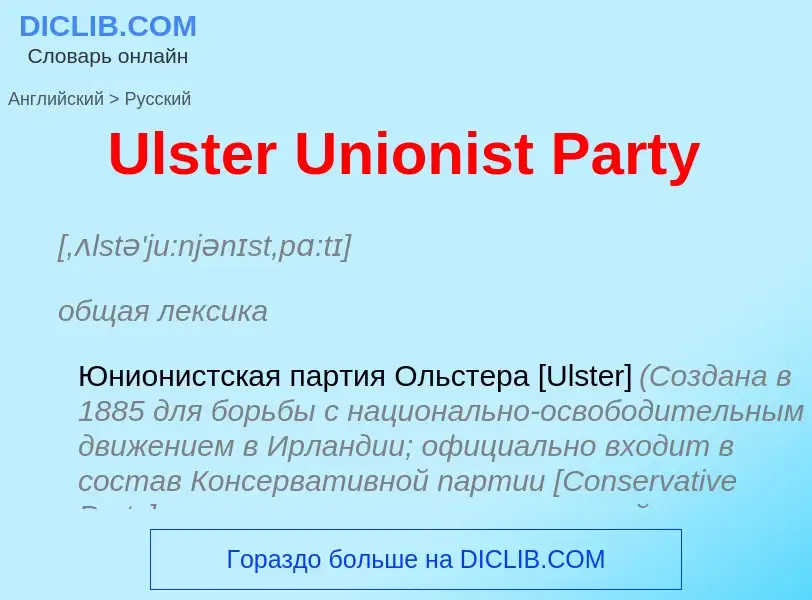Traducción y análisis de palabras por inteligencia artificial ChatGPT
En esta página puede obtener un análisis detallado de una palabra o frase, producido utilizando la mejor tecnología de inteligencia artificial hasta la fecha:
- cómo se usa la palabra
- frecuencia de uso
- se utiliza con más frecuencia en el habla oral o escrita
- opciones de traducción
- ejemplos de uso (varias frases con traducción)
- etimología
Ulster Unionist Party - traducción al Inglés
[,ʌlstə'ju:njənɪst,pɑ:tɪ]
общая лексика
Юнионистская партия Ольстера [Ulster] (Создана в 1885 для борьбы с национально-освободительным движением в Ирландии; официально входит в состав Консервативной партии [Conservative Party]; возглавляется протестантской буржуазией и земельными магнатами; пользуется поддержкой протестантов из числа мелкобуржуазных элементов, рабочих и фермеров)
[,lɪbtrtl'ju:njənɪst,pɑ:tɪ]
общая лексика
Либерал-юнионистская партия (состояла из либералов - противников гомруля [Home Rule], отколовшихся в 1886 от Либеральной партии [Liberal Party]; с 1895 выступала в коалиции с Консервативной партией [Conservative Party], с кот. позднее слилась)
[,demə,krætɪk'ju:njənɪst,pɑ:tɪ]
общая лексика
Демократическая юнионистская партия (реакционная протестантская политическая организация Северной Ирландии [Northern Ireland]. Создана правоэкстремистским деятелем священником М.Пейсли [Ian Paisley] в 1971 на основе Протестантской юнионистской партии [Protestant Unionist Party]; отвергает Саннингдейльское соглашение [Sunningdale agreement]; входит в Объединённый совет юнионистов Ольстера [United Ulster Unionist Council])
Definición
---
(СДПГ) , создана в 1869 на общегерманском рабочем съезде в Эйзенахе (руководители - В. Либкнехт и А. Бебель). В партии шла острая борьба между течениями [с нач. 20 в. три: ревизионистское, или правое (Э. Бернштейн, К. Легин, Ф. Эберт, Ф. Шейдеман, Г. Мюллер), центристское (К. Каутский, после 1910) и левое (К. Либкнехт, Р. Люксембург, К. Цеткин, Ф. Меринг, В. Пик), на основе которого образована в декабре 1918 КПГ. Находилась вне закона в 1878-90 и во время фашистской диктатуры (1933-45).
Wikipedia
The Ulster Unionist Party (UUP) is a unionist political party in Northern Ireland. The party was founded in 1905, emerging from the Irish Unionist Alliance in Ulster. Under Edward Carson, it led unionist opposition to the Irish Home Rule movement. Following the partition of Ireland, it was the governing party of Northern Ireland between 1921 and 1972. It was supported by most unionist voters throughout the conflict known as the Troubles, during which time it was often referred to as the Official Unionist Party (OUP).
Under David Trimble, the party helped negotiate the Good Friday Agreement of 1998, which ended the conflict. Trimble served as the first First Minister of Northern Ireland from 1998 to 2002. However, it was overtaken as the largest unionist party in 2003 by the Democratic Unionist Party (DUP). As of 2022 it is the fourth-largest party in the Northern Ireland Assembly, after the DUP, Sinn Féin, and the Alliance Party. The party has been unrepresented in Westminster since losing its two seats in 2017. Since 2021 the party has been led by Doug Beattie.
Between 1905 and 1972, its peers and MPs took the Conservative Party whip at Westminster, in effect functioning as the Northern Irish branch of the party. This arrangement came to an end in 1972 over disagreements over the Sunningdale Agreement. The two parties have remained institutionally separate ever since, with the exception of the 2009–2012 Ulster Conservatives and Unionists electoral alliance.










.png?width=200)

![F. E. Smith]] walking behind him, pre-1914 F. E. Smith]] walking behind him, pre-1914](https://commons.wikimedia.org/wiki/Special:FilePath/The Road To War Q81759.jpg?width=200)


![House of Commons]] (1886). House of Commons]] (1886).](https://commons.wikimedia.org/wiki/Special:FilePath/Gladstone debate on Irish Home Rule 8th April 1886 ILN.jpg?width=200)
 Chamberlain by John Singer Sargent.jpg?width=200)
![NPG]]). NPG]]).](https://commons.wikimedia.org/wiki/Special:FilePath/Spencer Compton Cavendish, 8th Duke of Devonshire by Sir Hubert von Herkomer.jpg?width=200)
